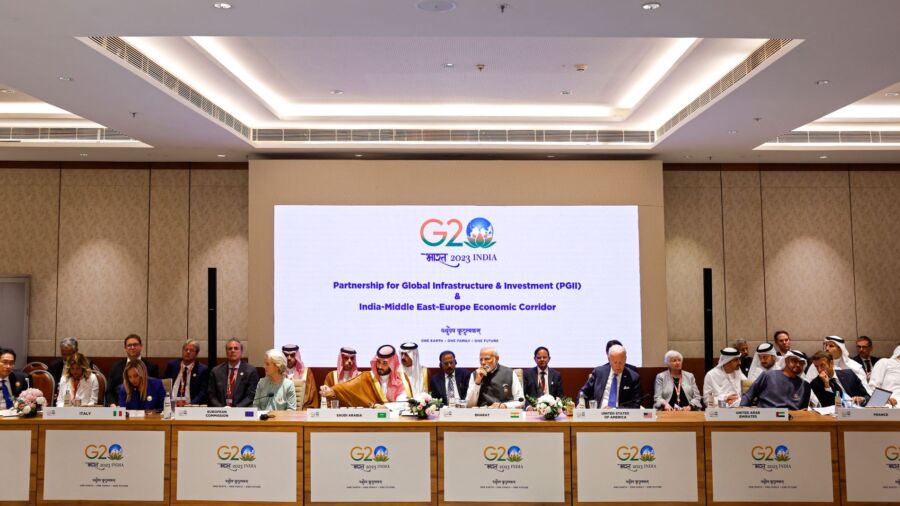The Group of 20 top world economies have adopted a consensus declaration that steered clear of directly condemning Russia over the war in Ukraine, instead broadly urging all nations to refrain from using force to annex territory. Additionally, the G20 welcomed the African Union as a new member.
Indian Prime Minister Narendra Modi announced the adoption of the Leaders’ Declaration on the first day of the two-day G20 summit in India’s capital, New Delhi. Beginning on Sept. 9, the summit convened to address major global and economic challenges. It marks the first time India is hosting the G20 summit, which was formed in 1999 in the aftermath of the Asian financial crisis.
“On the back of the hard work of all the teams, we have received consensus on the G20 Leaders Summit Declaration. I announce the adoption of this declaration,” Mr. Modi told the bloc leaders on Sept. 9, including U.S. President Joe Biden and heads of government and state from across the world, before clapping the table for a few seconds in celebration.
Compromise on Language
Possibly the most contentious issue at this year’s summit was how to address the Ukraine war in the joint statement. There had been doubt that an agreement could be adopted because of differences among members.
Despite objections from Russia and China over references to the Ukrainian conflict, Indian officials confirmed that the leaders reached a compromise on the language in several paragraphs to describe the war in Ukraine.
“We call on all states to uphold the principles of international law including territorial integrity and sovereignty, international humanitarian law, and the multilateral system that safeguards peace and stability,” the declaration said.
“We … welcome all relevant and constructive initiatives that support a comprehensive, just, and durable peace in Ukraine.
“In line with the U.N. Charter, all states must refrain from the threat or use of force to seek territorial acquisition against the territorial integrity and sovereignty or political independence of any state. The use or threat of use of nuclear weapons is inadmissible,” it added.
The G20 statement did not directly reference Russia’s invasion. It also had slightly milder language regarding the Russia–Ukraine war compared to the declaration from last year’s meeting in Bali. The statement from the Bali meeting said that “most members strongly condemned the war in Ukraine,” but “there were other views” as well.
However, the Bali statement had also quoted a U.N. resolution deploring “in the strongest terms the aggression by the Russian Federation against Ukraine and demands its complete and unconditional withdrawal from the territory of Ukraine.”
The New Delhi statement “recalled” the statement in Bali and the U.N. resolution, but didn’t quote the strong language from them.
The Ukrainian foreign ministry remarked that the latest G20 statement was “nothing to be proud of,” adding that G20 participants might have had a more accurate grasp of the situation if there was a Ukrainian presence at the summit. Ukrainian President Volodymyr Zelenskyy wasn’t invited to address the G20.
Russia, represented by Foreign Minister Sergei Lavrov at the summit, did not immediately react to the statement. Previously, Mr. Lavrov indicated that he would block the final declaration if it didn’t align with Moscow’s stance on Ukraine and other ongoing crises.
Black Sea Initiative
The summit came days after Russian President Vladimir Putin said that a deal facilitated by the United Nations and Turkey called the Black Sea Grain Initiative, which allowed for Ukraine to export grain safely via the Black Sea, would remain suspended until his conditions regarding Russia’s agricultural exports are met by Western nations.
Moscow had pulled out of the agreement in July over what it called a failure to meet its demands to implement a parallel agreement easing rules for its own food and fertilizer exports.
The G20 declaration urged the resumption of the Black Sea initiative. “This is necessary to meet the demand in developing and least developed countries, particularly those in Africa,” it said. The declaration also called for an end to any attacks on related infrastructure, and expressed “deep concern” about the effect of conflicts on civilians.
Africa Joins G20
The G20 members account for roughly 85 percent of the global gross domestic product. The group includes the Group of Seven (G7) countries, the European Union, and 12 other countries, including China, Russia, and Saudi Arabia. On Sept. 9, G20 leaders agreed to make the African Union (AU)—a bloc of 55 states in Africa—a permanent member, in an effort to make it more representative.
The summit takes place at a time when the rivalry between the United States and China is heating up and many countries are trying to avoid taking sides in order to gain from this conflict between two powerful countries.
Emel Akan, Reuters, and The Associated Press contributed to this report.
From The Epoch Times


